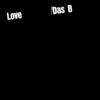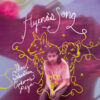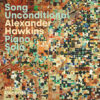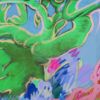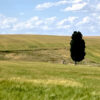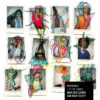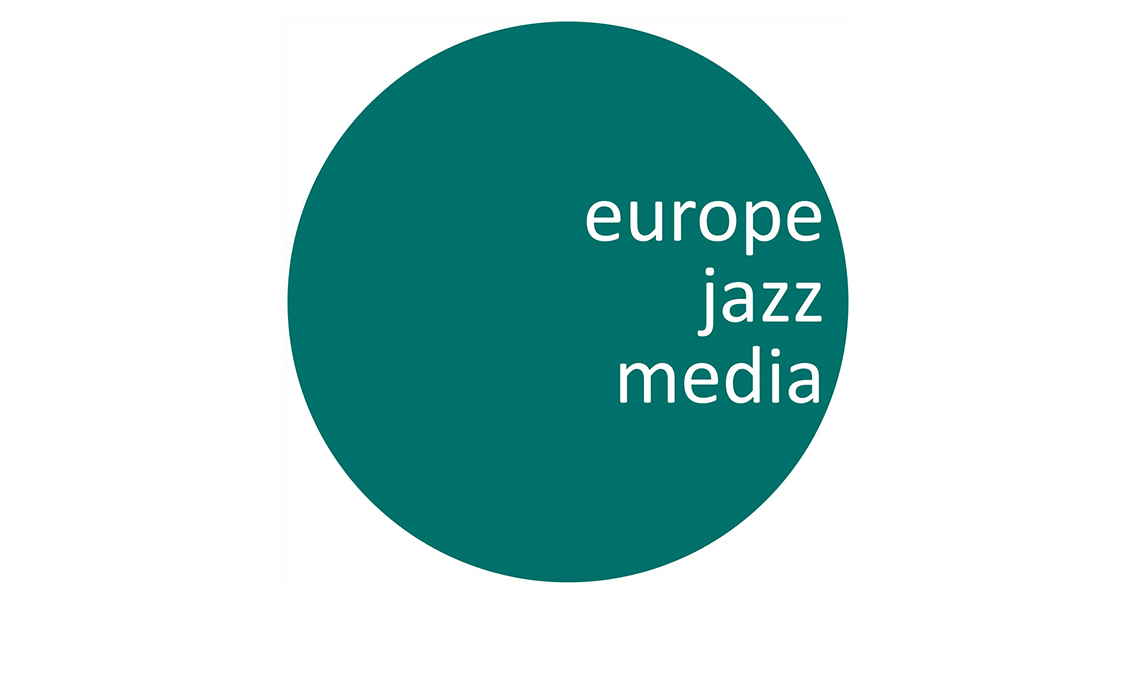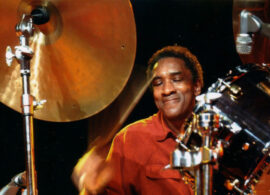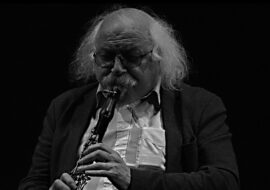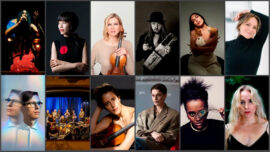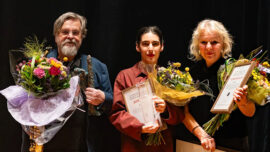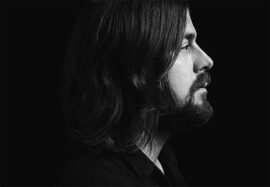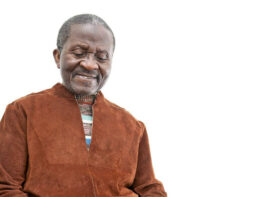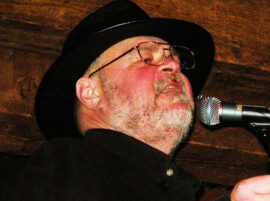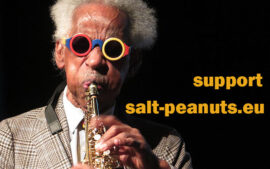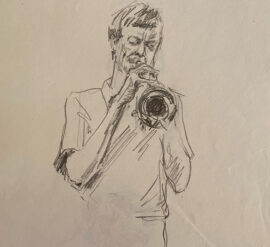En ny måned er over oss, med en rekke nye og spennende jazzutgivelser i stabler ved stereoanlegget. I tillegg begynner flere land å åpne opp etter pandemien, noe vi håper vi vare, og det er igjen mulig for de fleste av oss å høre levende musikk igjen.
Og som om det ikke var nok, så har Europe Jazz Media fått flere medlemmer, som bidrar til vår månedlige «spilleliste». Så nå ser alt ut til å gå rett vei.
Og her er hva de mange jazzredaktørene har lyttet mest til den senere tiden:
Madli-Liis Parts, Muusika:
ALEXEY KRUGLOV & JAAK SOOÄÄR «Music Without Borders» (Art Beat Music)
Paweł Brodowski, Jazz Forum:
ADAM BAŁDYCH QUINTET WITH PAOLO FRESU «Poetry» (ACT)
Mike Flynn, Jazzwise:
XHOSA COLE «K(no)w Them, K(no)w Us» (Stoney Lane Records)
Anna Filipieva, Jazz.Ru:
ANNA KOROLEVA «Antigravity» (Jazzist)
Jan Granlie, salt-peanuts.eu:
JONAS WESTERGAARD TRIO «Positioner / Positions» (ILK MUSIC)
Christine Stephan, Jazzthetik:
FABIANA STRIFFLER «Archiotíc» (Traumton)
Viktor Bensusan, jazzdergisi.com:
GIOVANNI MIRABASSI «Pensieri Isolati» (Jazz Eleven)
Henning Bolte, Written in Music:
ALISTAIR PAYNE / SUN-MI HONG IN: «Slow Walk» (self-released)
Tony Dudley-Evans, LondonJazz News:
RUTH GOLLERY «Skylla» (Vula Viel Records)
Magnus Nygren, Jazz:
CHRISTER BOTHÈN 3 «Omen» (Bocian Records)
Cim Meyer, Jazz Special:
CHES SMITH & WE ALL BREAK «Path Of Seven colors» (Pyroclastic Records)
Lars Mossefinn, Dag og tid:
FLUKTEN «Velkommen håp» (Odin Records)
Matthieu Jouan, citizenjazz.com:
CRAIG TABORN «Shadow Plays» (ECM)
Axel Stinshoff, Jazz thing:
FABIANA STRIFFLER «Archiotíc» (Traumton)
Luca Vitali, Giornale della Musica:
THE CLAUDIA QUINTET «Evidence-Based» (Flexatonic Records)
Eric Therer, JazzMania
BINKER GOLDING «Abstractions of Reality Past and Incredible Fearthers» (Gearbox)
Jos Demol, jazzhalo.be:
MARC JOHNSON «Overpass» (ECM)
Katherine Zyabluk, Meloport (Ukraine):
SONCE TRIO «Five Seasons» (self-released)
Jacek Brun, www.jazz-fun.de:
RAY ANDERSON POCKET BRASS BAND «Come In» (Double Moon Records)
Why did I choose –
Mike Flynn:
Cole has selected some of the most adventurous and exciting players from his Birmingham hometown to present a compelling exploration of what jazz means to him, paying tribute to his influences while creatively re-combining them, so the lush arrangement of Dameron’s swing-to-bop ‘On A Misty Night’ is spiced with Soweto Kinch’s Dolphy-esqe alto and Reuben James’ floridly romantic piano, Monk’s ‘Played Twice’ is pulled and stretched towards freedom by the virtuosic rhythm section, and Woody Shaw’s ‘Zoltan’ is tackled with a fearless abandon that recalls the spirit of Ornette’s classic quartets. Cole manages to convey his deeply felt reverence for the forebears without seeming overwhelmed: ‘Blues Connotation’ demonstrates how he uses his influences as a launchpad for some genuinely thrilling flights of invention, while Jay Phelps’ nimble, accurate trumpet provides the perfect foil for the leaders’ wide-ranging expressiveness. The wildly inventive bare-bones tenor trio reading of ‘What’s New’ displays a level of unaffected sincerity that’s rare in contemporary UK jazz. This is one of the most exciting releases of the year, brimming with potential.
Anna Filipieva:
The sophomore release on Jazzist, Moscow’s newest jazz label, features Anna Koroleva. On her earlier albums for an array of labels, she may have had explored free jazz, Cuban jazz, Russian folk, and funk; she played sax, or piano, or sang, or… Not on her latest outing where she returns to where she started two decades ago: performing her originals on alto sax, with an intensity and sincerity of someone who cannot wait to reach the long-left home after many exploratory travels. A dream team of Moscow jazz scene’s top players (Anton Baronin on the piano, Daria Chernakova on the acoustic bass, and Vartan Babayan on the drums) does an exquisite job of helping Anna telling her story as intensely and sincerely as possible.
Jan Granlie:
The Danish trio with bassist Jonas Westergaard, pianist Søren Kjærgaard and drummer Peter Bruun have previously released a record together as Jonas Westergaard Trio, namely the critically acclaimed «Helgoland». It was a project commissioned by Danmarks Radio, and featured excellent soloists in a larger ensemble. This time they have «stripped» the format to be only piano, bass and drums, even though the three compositions were written for a septet, and performed at the Serious Series Festival in Berlin in 2013 for the first time. Westergaard, Kjærgaard and Bruun are three of Denmark’s most exciting jazz performers. They have their own careers, and it was Bruun who was the initiator of the three to play together as a trio. We are getting three compositions, «Light / Light», «Positions» and «Värmland», and all the way it is thoughtful, meditative and extremely beautiful music.
In the opening track, thoughts are drawn to classical, romantic composers, coupled with a freer piano jazz, which has a lot of Bill Evans in it, although the musical expression is much more modern than Evans ever performed. And if you include the finest and most «complicated» parts of Keith Jarrett’s piano art, you approach Kjærgaard’s way of playing. Westergaard is well placed in the soundscape, and is the one who «decides the action», while Bruun’s drumming is brilliant. The second track, has a slightly different temperature. It starts more aggressively, but calms down after a while. Westergaard plays here with the bow at the beginning, but also visits «regular» finger play, and the music is much more rhythmically complex than the first track. The main theme is played once, before we get nine variations of the same rhythmic form in different lengths and formations. Somewhere in the middle of the composition, they open up the rhythmic, where the three improvise relatively free, before moving again into the rhythmic forms. The last track, is almost romantic, at least in the beginning.
It’s almost like they play an improvisation over the sweedish folk song «Ach, Värmland du sköna», before the Swedish landscape spreads out and we get a Danish interpretation of the Swedish landscape, almost close to what piano colleague Simon Toldam does on the album «Tak for dit brev» (ILK, 2020). But here I think the three are attacking Swedish nature in a slightly different way. Kjærgaard’s piano playing can also here be connected to Evans and Jarrett, but is still very personal. And some of the phrases he delivers are picked up by Westergaard who put them into the bass comp. There are records like this that make listening intensely to good jazz to be a great experience. What happens between the musicians, what they really «talk» about, how they take a small theme and spread it to become something completely different and exciting, and that it is possible to be so close to each other musically without have written everything down on notes.
«Positions / Positions» has become a beautiful, creative, exciting and extremely audible recording, which shows that three good friends can do much more exciting things when they meet after a long time than sitting in a pub, bragging about what they have done since last time they met. And here we get three compositions that are played, turned upside down, explored and analyzed by three excellent musicians. A record that will be high on the list when this year’s favorites are to be selected!
Henning Bolte:
Trumpet and drums: substantial tools when betaking oneself into danger zones, greet the dragons and sounding the world. These duets, created with Occam’s razor seem
to be both engraved and volatile, evident and ungraspable, daring and down to earth … And above all: they excel in playful clarity. Scotsman Payne and Korean woman Hong are part of a young and vibrant international scene shining in Amsterdam.
Tony Dudley-Evans:
This is a brilliant album that presents ‘bassist, vocalist, composer, environmentalist and now solo artist’ Ruth Goller’s imaginative arrangements for voices and electric bass.
In this she is ably supported by fellow vocalists, Lauren Kinsella and Alice Grant. Together they create quite unique textures of sound that are quite unlike anything I have heard.
As the press material says: «On ‘Skylla’, Goller in some ways returns to the pure untaught instincts that drove her as a teen punk musician. Working with different tunings for each song, Goller composes instinctively based on what she hears in every moment. As Goller puts it, ‘at that point muscle memory doesn’t work anymore so I have to trust my ear completely’. »
Paweł Brodowski:
Adam Baldych’s newest album marks the 10th anniversary of his cooperation with the ACT label. I rememeber vididly the great violinist’s breakthrough concert at JazzFest Berlin in 2011. I was there! Adam and his quintet literally blew the roof off at the Quasimodo club. Within seconds after the concert finished, even before the uproar in the audience died down, I saw ACT producer Siggi Loch rush backstage. The next day, the contract was signed. The prestigious German label gave him international notoriety as the new shooting star of jazz violin and opened the gate to countless concerts all over Europe.
„Poetry” is Adam’s seventh ACT album released under his own name. The violin virtuoso admits that he has mellowed over the years and now instead of showing chops and flexing muscles he prefers to search the inner depths of his soul. The newest project is titled „Poetry”. Appropriately so, as in five of the eleven tracks on the album the poet of the violin meets the poet of the trumpet – the great Paolo Fresu from Sardinia. Almost all the pieces were composed by Adam, the one exception being Bjork’s “Hyperballad”. The rest of the group include his Polish cohorts: Marek Konarski – tenor saxophone, Krzysztof Dys – piano, Michał Barański – bass, and Dawid Fortuna – drums.
Matthieu Jouan:
Another demonstration that improvised music takes on its full meaning in concert. This live performance from March 2020, recorded in Vienna, ranks pianist Craig Taborn among the greatest of the time. His technical mastery is phenomenal and allows him all the audacities, all the structures and all the forms. One goes through many atmospheres but the most exciting are those where a sort of rotating mechanism drags the listener into a vortex. The seven pieces of the concert/disc then form a world of their own, whose minerality is blunted by the strength of the silences.
Viktor Bensusan:
in the pandemic times creating forced isolation and seclusion, some went nuts and while Paris based Italian pianist Giovanni Mirabassi went notes…
Romantic and always Evansesque, Mirabassi performed the subtle soundtrack of our quarantines with a solo piano.
Magnus Nygren:
Beautiful trio recording with legendary Swede Christer Bothén. Bass and contrabass clarinets, drums (Konrad Agnas) and double bass (Vilhelm Bromander) in an energetic jazz setting. The music swings, argues and dig deep into the realms of fire music, but even so more Dolphy than Shepp. There is also moments of free improvised music performed in a concentrated but airy atmosphere.
Jos Demol:
“Despite its ascetic approach, «Overpass» is an intense listening experience.” (Georges Tonla Briquet)
Katherine Zyabluk:
Ukrainian vocalist Maryana Golovchenko moved to the Netherlands in 2011 to continue her music studies. She proved to be a well-rounded musician, manager and teacher, creatively rooted in Ukrainian musical heritage. A few years ago, in 2019, she founded the SonCe Trio with Pau Sola Masafrets on cello and Cengiz Arslanpay on modular synthesisers and woodwinds. In September 2021, they have recorded their debut album entitled Five Seasons, where musicians’ versatility and immersion in different musical spheres helped to display Maryana’s statement. Ancient Ukrainian ritual songs, arranged in the order of four seasons, represent the initial version of the life cycle. The fifth season merges them all and leaves freedom for the listeners’ interpretation.
Maryana’s voice is an exquisite combination of traditional folk singing and expressive melodic ornaments. Together with synthesisers and cello, it serves to underline the rhythm, make it sound unpredictable and trancelike at the same time — just like in ritual songs.
Moreover, there is a lot of place for thoughtful melodies, which are still tightly connected with the pulse; they create a placid pastel landscape, which probably musicians could imagine during the recording.
Five Seasons isn’t just a musical album. It could work with dance, theatre or fine artperformance and convey the story clearly and beautifully. It is like an introduction to the history of Ukrainian folk adapted to modern perception and should have its place in the world music’s anthology.
Jacek Brun:
How wonderfully they play! This is not only real improvised jazz, but also a sophisticated arrangement, improvisational freedom and excellent teamwork.


